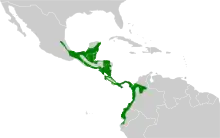| Lesser greenlet | |
|---|---|
_(7222933432).jpg.webp) | |
| Scientific classification | |
| Domain: | Eukaryota |
| Kingdom: | Animalia |
| Phylum: | Chordata |
| Class: | Aves |
| Order: | Passeriformes |
| Family: | Vireonidae |
| Genus: | Pachysylvia |
| Species: | P. decurtata |
| Binomial name | |
| Pachysylvia decurtata (Bonaparte, 1838) | |
 | |
| Synonyms | |
|
Hylophilus decurtatus | |
The lesser greenlet (Pachysylvia decurtata) is a small passerine bird in the vireo family. It breeds from northeastern Mexico south to western Ecuador.
This is a common species of lowlands and foothills up to 1,200 m (3,900 ft) altitude, where it inhabits forest canopy and edges, and the crowns of trees in tall second growth or semi-open areas. The nest is a deep cup of dead leaves and spiderwebs attached by the rim to branches 10–15 m (33–49 ft) high in a tree. The normal clutch is two brown-marked white eggs.
The adult lesser greenlet is 10 cm (3.9 in) in length and weighs 9 g (0.32 oz). It has olive-green upperparts and a pale grey head with a white eye ring. The underparts are white with a yellow tinge to the breast and some olive on the flanks. Young birds are duller and brown above, and have a buff tone to the sides of the head and the breast.
There are two races. Nominate H. d. decurtatus which breeds from central Panama southwards has a green crown to the head, and grey-crowned H. d. minor occupies the northern part of the bird's range. The latter subspecies was formerly given species status as the Grey-crowned Greenlet (H. minor) but the two forms interbreed extensively in central Panama and are now considered to be conspecific.
Lesser greenlets feed on spiders and insects gleaned from tree foliage, They also eat small fruits and seeds. They will join mixed-species feeding flocks, and often accompany gnatcatchers, warblers and honeycreepers.
The lesser greenlet has a nasal neeah-neeah-neeah-neeah call and the song is a whistled chi chi cher cher cher cher chiri cher which cheri, slower and more melodious than that of the yellow-green vireo.
References
- ↑ BirdLife International (2018). "Pachysylvia decurtata". IUCN Red List of Threatened Species. 2018: e.T22705321A130389921. doi:10.2305/IUCN.UK.2018-2.RLTS.T22705321A130389921.en. Retrieved 12 November 2021.
Further reading
- Skutch, Alexander F. (1960). "Gray-headed greenlet" (PDF). Life Histories of Central American Birds II. Pacific Coast Avifauna, Number 34. Berkeley, California: Cooper Ornithological Society. pp. 29–34.
External links
- "Lesser Greenlet media". Internet Bird Collection.
- Lesser Greenlet photo gallery at VIREO (Drexel University)
- Lesser Greenlet species account at Neotropical Birds (Cornell Lab of Ornithology)
- Interactive range map of Hylophilus decurtatus at IUCN Red List maps
